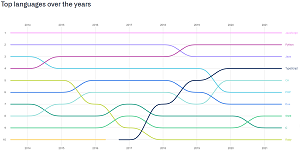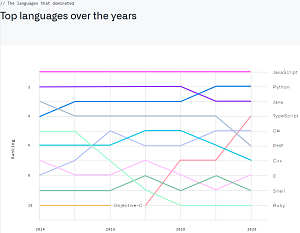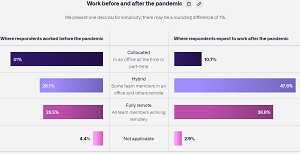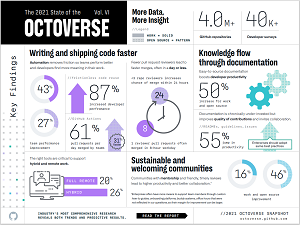News
TypeScript Surge Flatlines in New GitHub Octoverse Report
Last year's sprawling GitHub Octoverse report saw Microsoft's TypeScript programming language rise to No. 4 in the popularity ranking -- one step above C# -- after starting out at No. 10 in 2017.
As Visual Studio Magazine reported then, the climb appeared to be the largest upward movement recorded in GitHub's yearly rankings, which go back to 2014. It also reaffirmed many other reports on the rise of the language, which allows for using types in JavaScript.
This year, that surge has evened out. In fact, the standings are remarkably similar, with the only change being Shell and C swapping places, now ranking 8th and 9th, respectively. Here are the charts from the new 2021 report and last year's report:
 [Click on image for larger view.] 2021 Top Programming Languages Over Time (source: GitHub).
[Click on image for larger view.] 2021 Top Programming Languages Over Time (source: GitHub).
 [Click on image for larger view.] 2020 Top Programming Languages Over Time (source: GitHub).
[Click on image for larger view.] 2020 Top Programming Languages Over Time (source: GitHub).
Otherwise, this year's report gathered data from millions of developers using the open source-oriented code repository and development platform and segmented it to explore writing code faster, creating documentation and sustainable communities.
Here are GitHub's summaries and links to those individual reports:
- Writing and shipping code faster: Teams and developers who use automation to write and deploy code perform 27 percent better in open source and 43 percent better at work. In addition, we found these groups also report higher levels of fulfillment.
- Knowledge flow through documentation: Developers experience a 55 percent increase in productivity with good documentation. READMEs, issues, and thoughtful contribution guidelines all help make quality documentation. Enterprises can also adopt similar practices by building out robust internal documentation and innersource communities.
- Sustainable and welcoming communities: Teams who report high levels of trust are two times more likely to have a healthy collaborative culture within companies, and three times more likely in open source communities. Codes of conduct, contribution guidelines, good first issues, and respectful dialogue in GitHub Discussions signal safety and drive trust.
One finding in the "writing code faster" report shows a dramatic expected shift in work practices before and after the COVID-19 pandemic. Echoing many other similar findings, it shows hybrid schemes (working both at home and in the office according to various schedules) are expected to become the norm (47.6 percent of respondents) while collocated (in office all the time or part-time) approaches are expected to shrink from 41 percent of responents pre-pandemic to only 10.7 percent post-pandemic. Employees working fully remote are expected to increase from 26.5 percent pre-pandemic to 38.8 percent post-pandemic:
 [Click on image for larger view.] Work Before and After the Pandemic (source: GitHub).
[Click on image for larger view.] Work Before and After the Pandemic (source: GitHub).
"Last year, our approach to remote work reflected a lack of familiarity," the report said. "We were juggling competing needs in our personal lives and at work while trying to maintain the same levels of productivity before the pandemic. During 2021, we've begun to evolve from merely compensating while hoping for a return to the 'old normal' to truly metamorphosing our processes with the awareness of remote work needs."
GitHub's advice for working in the new normal?
"Think about your own team, and where you work now, and where you'll work in the future. How can you support yourself and your teams? Are you using processes and tools to support efficient collaboration? Merging pull requests, deploying code through pipelines, and organizing work become especially important when some or all of our team works remotely (all or some of the time). Our colleagues in open source have done this for years, so they can teach us a thing or two about shipping software in distributed teams."
 [Click on image for larger view.] 2021 State of the Octoverse (source: GitHub).
[Click on image for larger view.] 2021 State of the Octoverse (source: GitHub).
Other data highlights in that report and GitHub's advice on using that data include:
Automation
What the data shows: Good automation helps teams communicate better and more clearly, and the research shows that better information flow is key to a better culture. Having better tools also helps developers feel empowered to do their work and feel fulfilled.
Using the data: Use these charts to identify one thing you can work on to improve your work! Pick something on the bottom (at the end of an arrow), then work backwards to see what has a significant effect. For more details about each construct, head to the companion repository for the survey items we used.
Actions
What the data shows: Once large repositories start using Actions, teams merge almost 2x more pull requests per day than before (61 percent increase) and they merge 31 percent faster. Across all open source repositories, using Actions increases the number of merged pull requests by 36 percent and shrinks the time to merge by 33 percent.
Using the data: Automation helps teams. Try implementing automation around your pull requests to improve your team's productivity.
Code Reuse
What the data shows: Entitlement procedures, access restrictions, or information fragmentation can introduce friction that discourages developers from reusing code. However, developers' performance at work can increase by up to 87 percent when reusing others' code is easy and doesn't introduce friction. The benefits of frictionless code reuse are striking for open source projects too -- projects see 2x performance compared to those with more friction, like slow processes or multiple approval layers.
Using the data: Identify sources of friction when you and your team reuse code from other teams and repositories. Are there barriers such as lengthy access approvals, poor indexing, or undocumented dependencies? What can you simplify, or influence others to streamline?
Search
What the data shows: Developers are almost 60 percent more likely to feel equipped to do their job when they can easily find what they need. Plus, they can get an 11 percent productivity bump simply by having a team repo that is easy to search -- a finding supported by earlier research as well.
Using the data: Think about your team practices; do they support easy indexing and cross-referencing so information is easier to find?
Pull Requests
What the data shows: This year, pull requests are merged the fastest at work, almost 2x faster than open source. We also see that pull requests at work are merged 25 percent slower than last year. When we compare the previous two years, we can see signs that work rhythm is returning to pre-pandemic levels.
Using the data: Think about your own work. What have you noticed about your team's or community's speed of completing work this year? If your own team's merge time has changed, what contributed to that?
For the "2021 State of the Octoverse" report, GitHub said it had expanded its research approach. "By augmenting telemetry from 4 million repositories with survey responses from over 40,000 developers, you can read through predictive results and tips for improving productivity in addition to the quantitative summaries of survey results."
About the Author
David Ramel is an editor and writer at Converge 360.